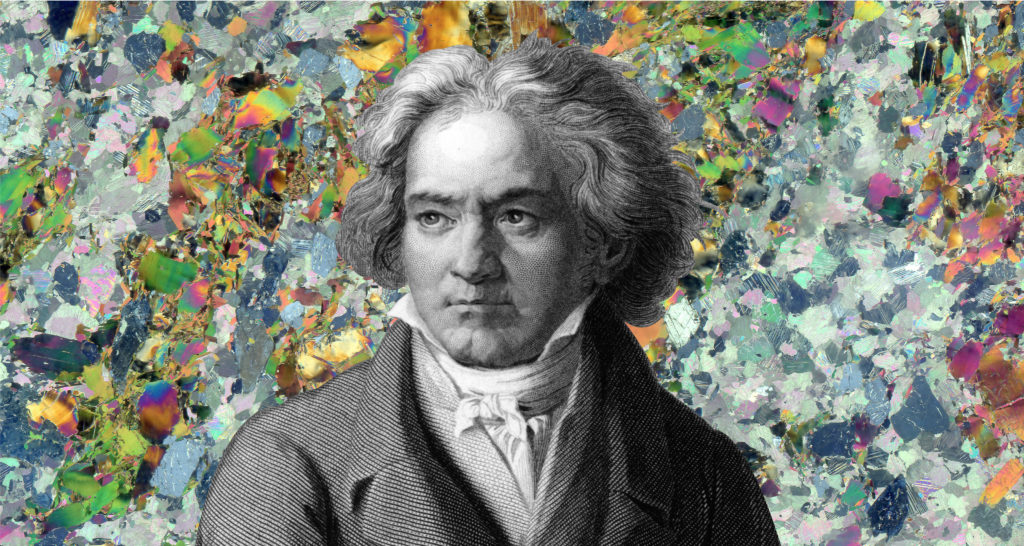
Earlier this week, musicians of the Rotterdam Philharmonic Orchestra performed Beethoven’s famous “Ode to Joy” from the Ninth Symphony. Only, the performers weren’t side by side in a concert hall. Instead, they joined together digitally from isolation in their homes.
With COVID-19 spreading worldwide, concerts have been cancelled and gatherings have been strongly discouraged, if not outright banned. But musicians all over the world—from Italian balconies to Dutch living rooms to empty concert halls in America—are still managing to create music together (click here for our guide to online listening).
This isn’t the first time Beethoven’s setting of a poem Friedrich Schiller has been invoked in emotional times. Since the composer completed his Ninth Symphony in 1824, “Ode to Joy” has been harnessed for ill and for good, in the name of both dictatorships and democracies. But the anthem seems to ring most true when it underscores unity and a shared desire for triumph over adversity. As the Guardian’s Tom Service writes:
That final movement itself is then an enactment of a victory for humanity, as individuals come together in joy and love: a community of choir, vocal soloists, and musicians that isn’t led by great men or even by God, but rather is built on the bonds between ‘brothers’ of Schiller’s poem, as this new, true heroism of humanity creates its own destiny and fashions the world in which Beethoven wanted to live.
The following are just a few moments in history when Beethoven’s ode inspired joy in times of darkness.
Paul Robeson Sings For The Underdog
During his career, vocalist Paul Robeson usually avoided singing classical music, once stating that European traditions had “nothing in common with the history of my slave ancestors.” He almost exclusively devoted himself to spirituals, protest songs and folk ballads, championing the oppressed through music. That was certainly the case with his unlikely but devoted relationship with group of working-class miners in Wales, whom Robeson supported in their protests against low wages and unsafe working conditions.
On the occasion he did perform classical works, he reframed them as folk music. Robeson’s “Ode to Joy” replaces the orchestra with a single piano, and he opts to sing in English rather than German, driving home the message of brotherhood to his English-speaking audiences. Robeson’s leftist politics lead to his blacklisting during the McCarthy Era, leaving him unable to travel with a revoked passport. So when the Welsh miners invited him to perform at a festival 1957, his only choice was to sing across the sea via a transatlantic telephone line. He dedicated his version of “Ode to Joy” to the crowd of 5,000, supporting their struggle for what he called “a world where we can live abundant and dignified lives.”
Chilean Women Protest A Violent Dictator
In 1973, military dictator Augusto Pinochet assumed power in Chile and oversaw the imprisonment and torture of tens of thousands of people belonging to opposition groups. At the risk of their own lives, female protesters gathered outside torture prisons to sing the “Himno a la Alegria,” a hymn based on “Ode to Joy,” to bring hope to those being held inside. You can see a clip of the protest in the documentary Following the Ninth:
Bernstein Celebrates The Reunification Of Germany
On Christmas Day 1989, East and West Berliners were able to celebrate the holiday together for the first time in 28 years. To mark the fall of the Berlin wall and foster a spirit of brotherhood, Leonard Bernstein lead a performance of Beethoven’s Ninth with choir and orchestra members from both East and West Germany, as well as from WWII Allied powers: the United States, France, Great Britain and the Soviet Union. During Beethoven’s final climactic ode, Bernstein replaced the word “joy” with “freedom,” a small but significant change that resonated with the thousands of Germans that lined the streets outside the concert hall, free to gather together for the first time in decades.
Japan Commemorates With 10,000 Voices
Beethoven’s Ninth was first introduced in Japan by German POWs held captive during WWI, and it has since become a beloved Japanese tradition to perform “Daiku” or “Big Nine” each December. A particularly poignant performance, featuring a choir of 10,000, was held in 2011 after the devastating tsunami hit Japan.